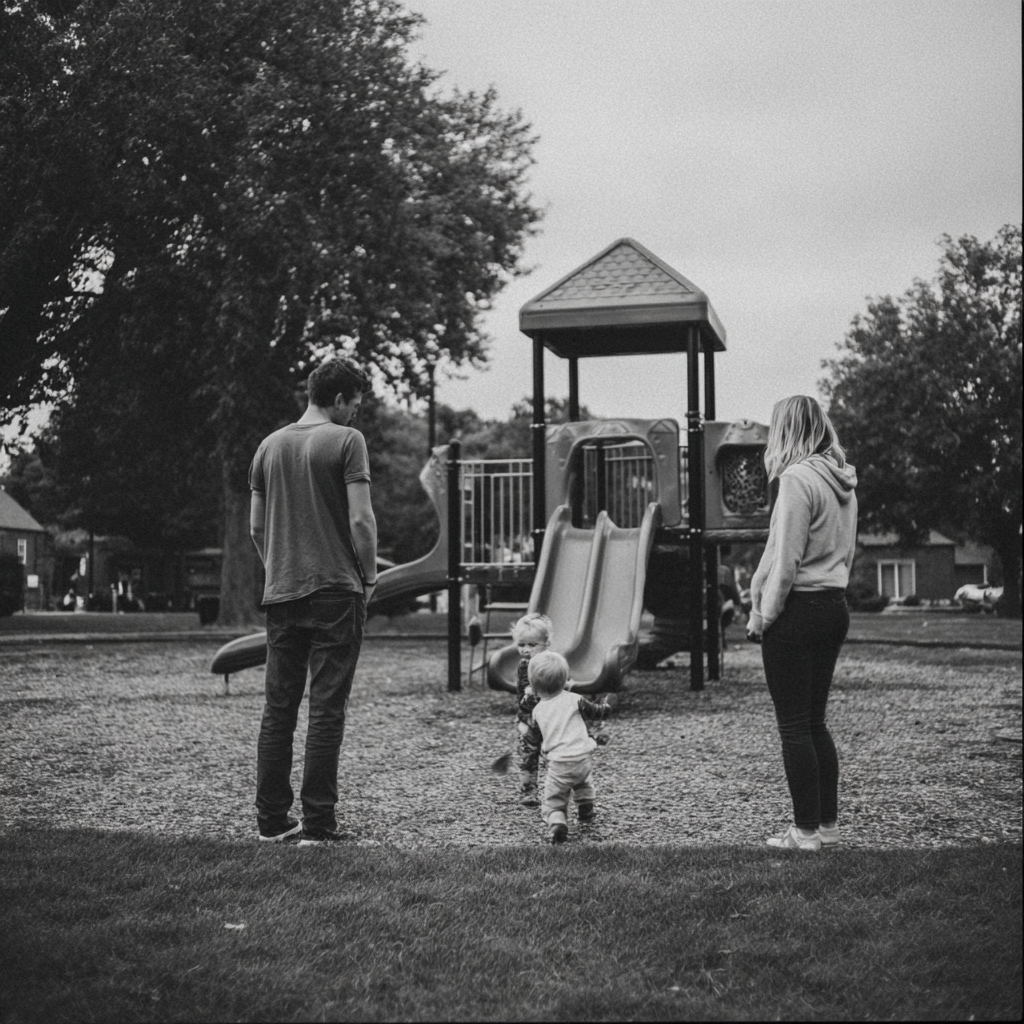Since the United States Housing Act, affordable housing for low income families and individuals have been built and maintained to provide housing assistance to those who need it. Public housing is a federal program designed to provide housing to low-income families. The program is operated by the U.S. Department of Housing and Urban Development (HUD) and managed by local public housing authorities. Most public housing is owned by the local agencies that maintain the properties with funding from HUD. Public housing is often confused with Section 8, so it’s helpful to clarify some of their differences by answering key questions.
8 Common Questions About Public Housing
What is public housing?
Is public housing the same as Section 8?
Who is eligible for public housing?
How can I apply for public housing?
How long do I have to wait?
What if my application for public housing is denied?
How much is my rent?
How long does public housing last?
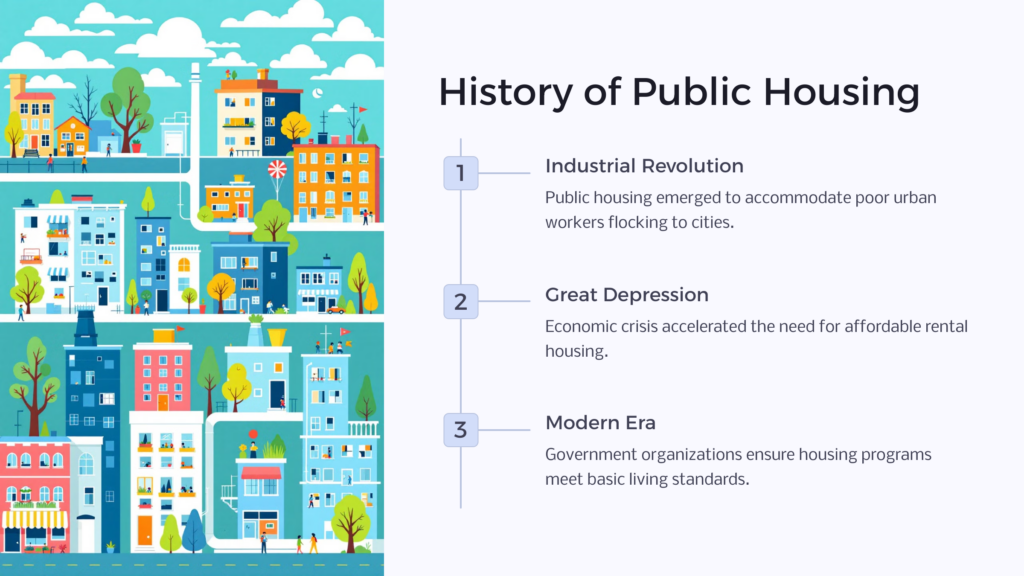
The need for public housing began during the Industrial Revolution. A public housing development provided a place to live for poor urban residents who had flocked to the cities in search of work. As you might imagine, these original public housing projects weren’t maintained very well. But over the years, government organizations have stepped in to ensure that housing programs adhere to basic standards of living and offer affordable rental housing that is safe and secure.
This is especially true in the United States, ever since the first low income housing projects were built in Atlanta, Georgia. The Great Depression greatly accelerated the need for affordable rental housing. Today, thousands of so-called housing projects exist around the country, offering low-income residents the opportunity to find safe and dignified housing.
While public housing has seen vast improvements in terms of quality and administration, the HUD asserts that its programs are underfunded. Much of the public housing around the country comes in the form of older apartment buildings, often referred to as projects, that need overhaul or repair. Nevertheless, these low income housing projects are a better alternative to a life of homelessness.
Public housing residents see ancillary benefits from participating in the public housing program. For instance, research has shown that eligible low income families with permanent, secure shelter in a public housing unit are more likely to have a primary care doctor, resulting in fewer emergency room treatments. Low-income households see their children benefit from affordable housing units provided by public housing assistance. Students of families living in a public housing project perform better in school than students who have affordable housing issues. In the long term, the stability afforded to a low-income family through a public housing agency results in lower rates of incarceration, across all ethnic groups.
Of course, the main benefit of public housing for residents is the opportunity to have a roof over their heads, four walls, running water, and electricity…not to mention the safety and security provided by having a lock on the door.
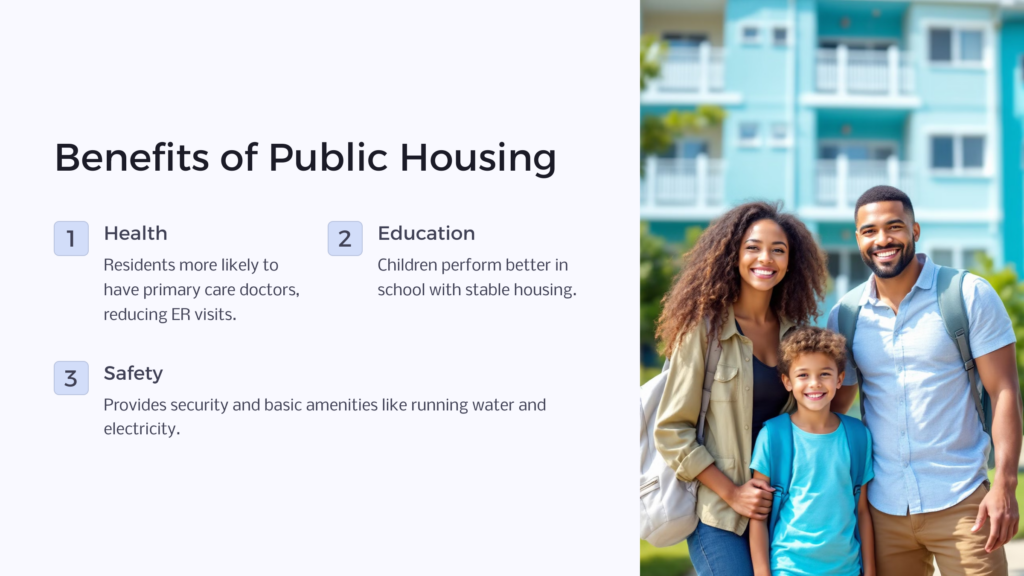
What is public housing?
Public housing exists to help low-income individuals and families find a safe place to live. These renters might not be able to locate safe and clean living accommodations on the private real estate market, due to their limited financial resources. Public housing is not the same as Section 8 or social housing, which may be co-owned and co-managed by the state and a non-profit organization. There is also privately-owned community housing, which may be owned and managed entirely by a non-profit organization, such as one that helps abused women or recovering drug addicts. Social housing and private housing are not forms of public housing.
Is public housing the same as Section 8?
Public housing is commonly confused with Section 8, but they are not the same. However, both programs are run by HUD. Section 8 units are owned by private landlords who accept Section 8 vouchers from their renters. Public housing, in contrast, is entirely government-owned and operated.
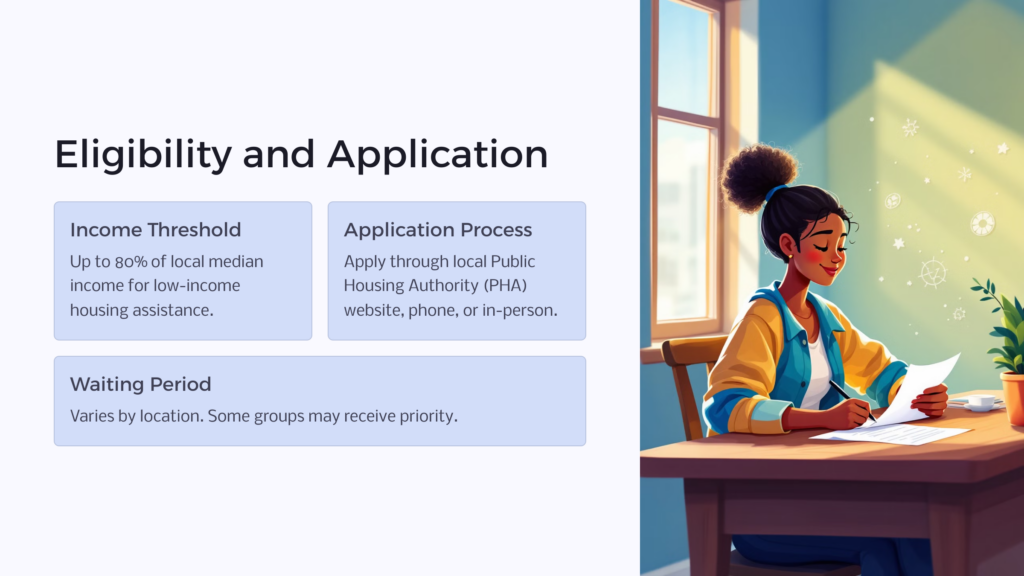
Who is eligible for public housing?
Public housing is made available to renters based on gross annual income, family size, citizenship status, and whether a renter might qualify based on disability or age. In terms of income, the upper threshold is 80% of the local median income to be considered for low-income housing assistance and 50% of the local median income.
How can I apply for public housing?
The best place to start is the website of your local public housing authority (PHA). You can also apply over the phone, or in person by visiting a local PHA office. If you need help locating your local housing authority, you can conduct a Google search or visit the contact page on HUD’s website. The local housing authority managing the property will review your application and do a background check. This background check is especially relevant to the safety and well-being of the other renters because public housing tends to be a larger, multifamily property.
How long do I have to wait?
There is no simple answer to this question, so it’s best to ask the PHA where you applied. Most housing programs have very long waiting lists, so you may want to apply to several different places. Though it’s not required universally, some housing authorities may give precedence to renters with certain conditions, such as a family, disabled individuals, or veterans. If you fall into any of these categories, you may want to look for a PHA that gives these groups priority.
What if my application for public housing is denied?
If your application is denied, the PHA is required to provide you with a written reason. You can review this reason and request an informal hearing, where you can appeal the decision and provide additional relevant documentation. For example, if you have an eviction on record, you can explain the extenuating circumstances (such as an abusive ex-spouse). If you owe another PHA rent money but can’t pay it, the new PHA may offer options. But if you were evicted from another PHA for a drug offense in the past three years or are a lifetime registered sex offender, an informal appeal will not help you overturn the denial.
How much is my rent?
The Total Tenant Payment (TTP) is based on anticipated gross annual income minus deductions – such as $480 per dependent and $400 per elderly renter or disabled renter. The PHA may approve other medical deductions. Gross annual income is calculated from all household members over the age of 18 (including adult children). The TTP will be the highest number among the following: 30% of the adjusted monthly income, 10% of the monthly income, welfare rent, or a $25-$50 minimum rent. Keep in mind that not every PHA offers welfare rent or a low monthly minimum rent. Government-issued benefits such as food stamps or Medicaid do not count toward calculating an annual gross income.
How long does public housing last?
You can stay in public housing as long as you continue to qualify. You are required to report income changes, such as a new job. The PHA may still approve public housing if the income-earner had previously been unemployed for 12 months, received TANF (Temporary Assistance for Needy Families) in the past 6 months, participates in a job training, substance abuse, or ESL course, or is disabled.
Know Your Housing Rights

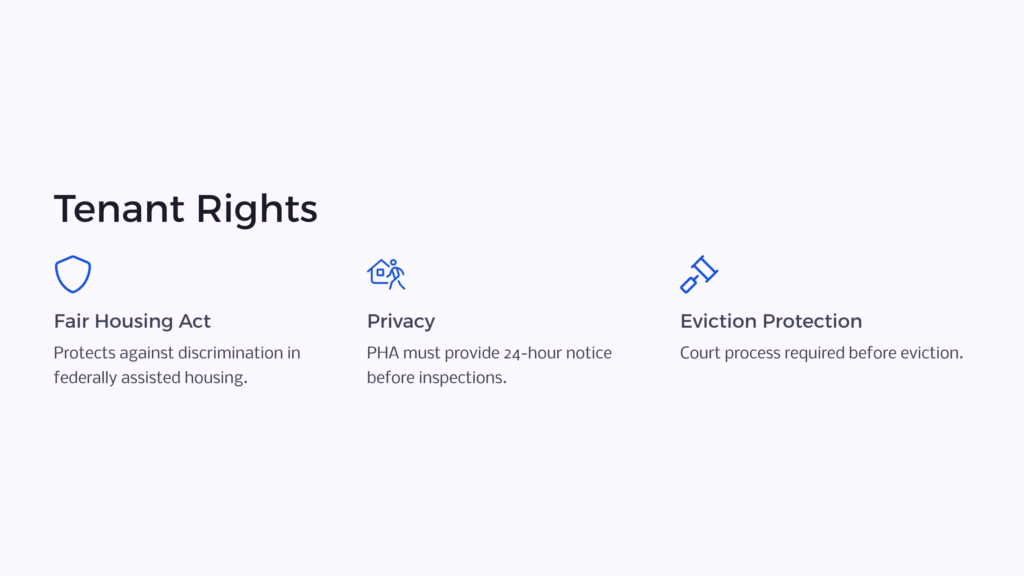
The Fair Housing Act prevents homebuyers and renters from discrimination based on race, religion, gender, family status, and disability. This includes federally assisted housing like public housing.
There are a variety of other rules to know about your housing rights. For example, the PHA cannot inspect your home without providing 24-hour advance notice, and the inspection can only occur at a reasonable time. Written notice must be left if they enter the home in your absence. Routine maintenance, repairs, and showing the unit to its next potential renter are all valid reasons for an inspection.
If you have a grievance with something the PHA has done, there is a grievance filing process for submitting complaints. Regarding evictions, the PHA has the authority to evict you for violating the terms of the lease, including missed payments. However, they cannot evict you until they take you to court, so you will have a chance to present your side of the story before a judge.
It’s also important for renters using a Section 8 voucher to know their rights. Since these renters are living in spaces managed by private property owners, with less direct oversight from the government. By the same token, it’s important not to assume that just because public housing is managed by a local government agency that it will be free from the potential for grievances.
Public Housing Assistance
Public Housing is commonly confused with Section 8 housing, but it’s a very different program. The main difference lies in the fact that Section 8 vouchers can be taken to a private landlord, while public housing is owned and managed by the government. Section 8 tenants can move into a different rental unit and take their Section 8 voucher with them. With public housing, the financial assistance is tied to the unit, not the person. If you move out of your public housing unit, you lose your benefits.
In most cases, public housing arrangements are found in a multifamily property, such as a large apartment building or community of townhomes. If you or a family member need public housing assistance, visit HUD.gov to find a PHA near you.
 Benefits.com Advisors
Benefits.com Advisors
With expertise spanning local, state, and federal benefit programs, our team is dedicated to guiding individuals towards the perfect program tailored to their unique circumstances.
Rise to the top with Peak Benefits!
Join our Peak Benefits Newsletter for the latest news, resources, and offers on all things government benefits.


















